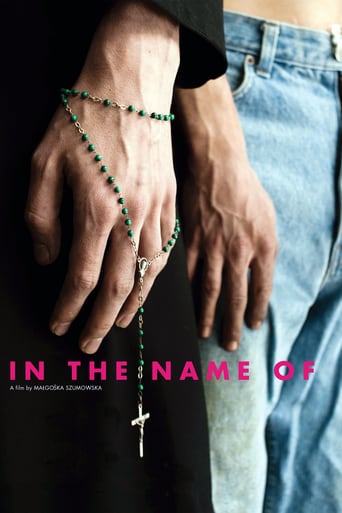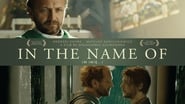jm10701
This is a very effective, very positive and yet oddly disturbing movie about the fitful coming out of a 40ish gay priest in Poland. His name is Adam, and he looks nothing like a priest except while on duty. He's always known he's gay, but he's serious about his vocation and has stayed closeted in order to keep his vows of celibacy.He has a special gift for helping troubled teenage boys, which his superiors value greatly. His homosexuality has never led to anything remotely inappropriate with a boy (or with a man, for that matter), but he is periodically transferred in order to keep even rumors from interfering with his very valuable ministry. Most recently he was moved from Warsaw to an isolated rural parish with a small work-home for boys on furlough from reformatories.This is a complex movie, and trying to summarize its plot would be a disservice. It is not predictable, not typical of gay movies, of priest movies, or of any other sort of movies I can think of. It's not the story of a type of man but of THIS man. So, like any real human being, Adam is more complicated than a normal movie character, and the director does not try to make him easy to understand.In part because it's NOT predictable, this movie is fascinating to watch, and the end is especially satisfying. The movie is disturbing not because of anything that happens, but because everyone and everything in it looks dirty.I know that sounds superficial, but sometimes the most superficial things in life are the most distressing. Even after bathing, the characters look grimy, everything indoors is dingy, and outdoors is nothing but dust. I don't know if rural Poland really is as miserable as this movie makes it appear, or if the director was intentionally creating a disturbing ambiance for the movie.Although it's disturbing, that ambiance adds to the complexity of the movie and enhances its effectiveness. I watched it twice; it was richer and even more satisfying the second time.
gradyharp
Polish director Malgorzata Szumowska accomplishes an outstandingly effective, brave examination of Catholic priesthood with all the inherent difficulties both within the life of being a celibate priest in a time when the world's eye is focused on the abuses within the Church. She wrote the screenplay with Michal Englert who also is the cinematographer. The film succeeds not only because of the sensitivity of the script but also because of the extraordinary acting by several of the members of the cast. Adam (the brilliant actor Andrzej Chyra) is a Jesuit Catholic priest who discovered his calling as a servant of God at the relatively late age of 21 and has been transferred to many different parishes – the reasons are not completely clear. He is a kind, warm, caring and committed priest who truly cares of this flock. He now lives in a village in rural Poland where he works with teenagers with behavioral problems who fight and yell abuse. He declines the advances of a young brunette named Ewa (Maja Ostaszewska) saying he is already spoken for: Ewa is the love reason Adam's associate teacher Michal (Lukasz Simlat) left the seminary and never became a priest. But celibacy is not the only reason for his rejection. Adam knows that he desires men and that his embrace of the priesthood has been a flight from his own sexuality. When he meets Lukasz (Mateusz Kosciukiewicz, the director's husband), the strange and tongue-tied son of a simple rural family, Adam's self-imposed abstinence becomes a heavy burden. He hears the confession of a teen who has had a same sex encounter elsewhere and when a new addition to the camp Adrian/Blondie (Tomasz Schuchardt), the lad is seduced by Blondie and the result is the lad's suicide by hanging. Lukasz sustains a beating and seeks Adam's solace and healing at night, and that innocent tender encounter is observed by Michal. The Bishop is alerted and Adam must leave for yet another assignment. He is followed by Lukasz and at last Adam's quandary is at least for the moment resolved.The film is rich in metaphorical scenes – a Skype call between Adam and his Toronto based sister shares Adam's desperate need to have someone to hug, Adam turns to drinking and in his altered state he drunkenly dances with a photograph of the Pope – his only allowed passion, a funeral scene for the fallen lad, and a mesmerizingly beautiful religious celebration parade full of overtones. The film may for some be too huge in character depth and audiences more attuned to action based movies it might be too slow and deep and fragmented. Were it not for the brilliance of Andrzej Chyra's Adam the film may even offend some. But the total experience of the film is deeply moving.
zzbigniew
Wonderful treatment of the charged subject of men who love men in Catholic society and within the church in particular. Subtle script,phenomenal acting, and a very gentle approach to the characters and their humanness. Last but not least, every shot is a masterpiece of composition, lighting, and attention to colors and details. Undoubtedly this film presents a heretofore taboo topic and offers a human and livable solution to the real-life misery that so many men who love men have experienced over the ages, especially in conservative societies. Throughout the film I thought of it as one that only describes but prescribed a reality that it helps emerge by depicting it as an option. The main protagonist is so lovable and good-intentioned that it comes could really provide as a cobblestone on the path to social change vis-a-vis homophobia.
Sindre Kaspersen
Polish screenwriter, producer and director Malgorzata Szumowska's fifth feature film which she co-wrote with Polish screenwriter and cinematographer Michal Englert and co-produced, is inspired by an article she read in a newspaper. It premiered In competition at the 63rd Berlin International Film Festival in 2013, was shot on location in Poland and is a Polish production which was produced by producer Agnieszka Kurzydlo. It tells the story about a Polish Catholic priest named Adam whom has been moved from his position in Warsaw and transferred to a rural village where he in addition to practicing and performing his duties as a priest manages a center for disadvantaged young boys with his friend named Michal. Adam starts becoming friendly with a woman named Ewa whilst he is staying there, but as Adam's colleague, the young boys he is working with and the people who lives there, she is unaware that Adam is hiding something.Distinctly and subtly directed by European filmmaker Malgorzata Szumowska, this finely paced fictional tale which is narrated from multiple viewpoints though mostly from the main character's point of view, draws a mindful portrayal of a man of faith who does not have priest written all over him, who is in an ongoing ordeal with chastising himself and his relationship with a younger man named Lukasz. While notable for its naturalistic and atmospheric milieu depictions, fine production design by production designer Marek Zawierucha, sterling cinematography by Polish cinematographer Michal Englert and use of colors and light, this narrative-driven story which quietly and efficiently conveys how in some cases intolerance and certain traditional views can undermine the dignity of, cause involuntary and unnecessary loneliness and in the worst case scenario make someone think that they have no place in a society and that they in staying true to themselves have betrayed others in an unredeemable way, depicts a heartrending and empathic study of character and contains a great instrumental score by composers Pawel Mykietyn and Adam Walicki.This modestly romantic, at times humorous, somewhat impassioned, conversational and far from overly theological, political or preaching drama which is set during a summer in Poland in the 21st century and which salutes the human spirit and its unwritten right to pursue its true nature is an exemplary and pivotal contribution to modern cinema from a filmmaker who in the name of… tells this love-story in the same way as a heterosexual love-story would be told and whose love for her characters and for cinema shines through, and is impelled and reinforced by its cogent narrative structure, subtle character development and continuity, various characters, timely and efficient use of music, unsettling though poignant analogy, commendable and humane examination of its central theme and the fine acting performances by Polish actors Andrzej Chyra, Mateusz Kosciukiewicz, Lukasz Simlat and Polish actress Maja Ostaszewska. A tangible, conscientious, eloquent and cinematographic narrative feature which gained the Teddy Award for Best Feature Film at the 63rd Berlin Film Festival in 2013.







